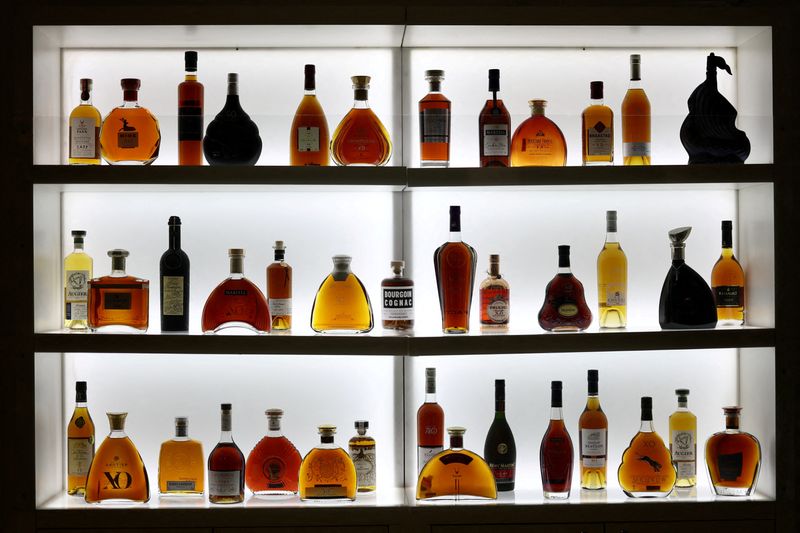Paris/Brussels, June 27, 2025 — In a strategic move, China has linked a tentative agreement on minimum import prices for French cognac to progress in negotiations over European Union (EU) tariffs on Chinese-made electric vehicles (EVs), sources familiar with the talks revealed. With a July 5 deadline looming for China’s anti-dumping probe into European brandy, this development signals Beijing’s intent to leverage its economic clout in the escalating trade dispute, impacting major players like Pernod Ricard and Remy Cointreau.
A Tentative Cognac Deal with Strings Attached
France’s cognac industry, reeling from a 70% drop in exports to China since Beijing imposed temporary duties of up to 39% last October, has reached a provisional agreement on minimum import prices, according to Reuters. The deal, detailed in a June 12 briefing by the BNIC (Bureau National Interprofessionnel du Cognac), sets prices at 46 yuan ($6.39) per liter for Very Superior (VS) cognac, 424 yuan for Extra Old (XO), and 613 yuan ($85) for premium XXO. Major houses like Hennessy, Martell, and Remy Martin face higher minimums than smaller producers, though still below current levels.
However, China has conditioned finalizing this deal on advancements in separate EU-China talks over EV tariffs, five sources confirmed. “Beijing is playing hardball, using cognac as a bargaining chip to soften EU restrictions on its electric vehicles,” said a trade analyst based in Brussels, speaking anonymously due to the sensitivity of the negotiations. This linkage has left French cognac makers, who view themselves as “collateral damage” in the broader trade row, anxiously awaiting outcomes from EV discussions.
The Roots of the Trade Dispute
The EU’s decision to impose tariffs of up to 45.3% on Chinese EVs, effective October 2024, sparked the current standoff. Following a year-long anti-subsidy investigation, the European Commission accused Beijing of providing unfair subsidies to its auto industry, including preferential financing and below-market raw materials. Tariffs range from 7.8% for Tesla to 35.3% for SAIC, added to the EU’s standard 10% car import duty. France’s vocal support for these tariffs prompted China’s retaliatory duties on cognac, alongside probes into EU pork and dairy imports.
Cognac exports to China, the world’s most valuable market for the spirit, have plummeted, with shares of Remy Cointreau and Pernod Ricard dropping 35% and 33%, respectively, since last October, per BNIC data. “Our industry is caught in a geopolitical crossfire we didn’t start,” said Marie Dubois, a spokesperson for a leading cognac producer, highlighting the sector’s frustration.
Beijing’s Push for Minimum Price Commitments
China is urging the EU to replace EV tariffs with minimum price commitments, similar to the cognac deal, to avoid duties while ensuring competitive pricing. “Beijing sees this as a win-win, maintaining market access without escalating the trade war,” said Li Wei, a Shanghai-based trade consultant. However, EU officials report “limited progress” in EV talks, with the European Commission remaining silent on the cognac agreement’s status. A pivotal EU-China summit on July 24-25, marking 50 years of diplomatic relations, will prioritize trade, offering a potential breakthrough.
French Trade Minister Laurent Saint-Martin, visiting the Cognac region this week, described minimum price talks as “on the right track” but cautioned that no deal is finalized. “We’re working tirelessly to protect our producers while navigating complex global dynamics,” he told local media.
Broader Implications Amid Global Trade Tensions
The timing is critical as U.S. President Donald Trump’s aggressive tariffs on China and the EU, effective April 2025, have pushed Beijing and Brussels closer together. China’s Commerce Minister Wang Wentao and EU Trade Commissioner Maros Sefcovic resumed talks on April 10, with Beijing citing U.S. tariffs as a motivator for deeper EU cooperation. “Trump’s trade war is inadvertently strengthening China-EU ties,” noted Anna Rosenberg of Signum Global, pointing to fears of Chinese goods flooding Europe if U.S. markets close.
Germany, whose carmakers like Volkswagen rely heavily on China, opposed the EU’s EV tariffs, fearing retaliation. The German Association of the Automotive Industry (VDA) called the duties a “mistake,” advocating for negotiated solutions. Meanwhile, Spain and other EU nations face risks from China’s probes into pork and dairy, highlighting the broader economic stakes.
What This Means
The linkage of the cognac deal to EV tariff talks underscores China’s strategic use of trade leverage, placing pressure on the EU to compromise ahead of the July summit. For French cognac makers, a finalized agreement could restore access to China’s lucrative market, but only if EV talks progress. For the EU, balancing industrial protection with trade stability is paramount, especially as global tariff wars intensify. Readers should watch the July 5 deadline and the upcoming summit for signals on whether this high-stakes negotiation will ease tensions or deepen the divide.
